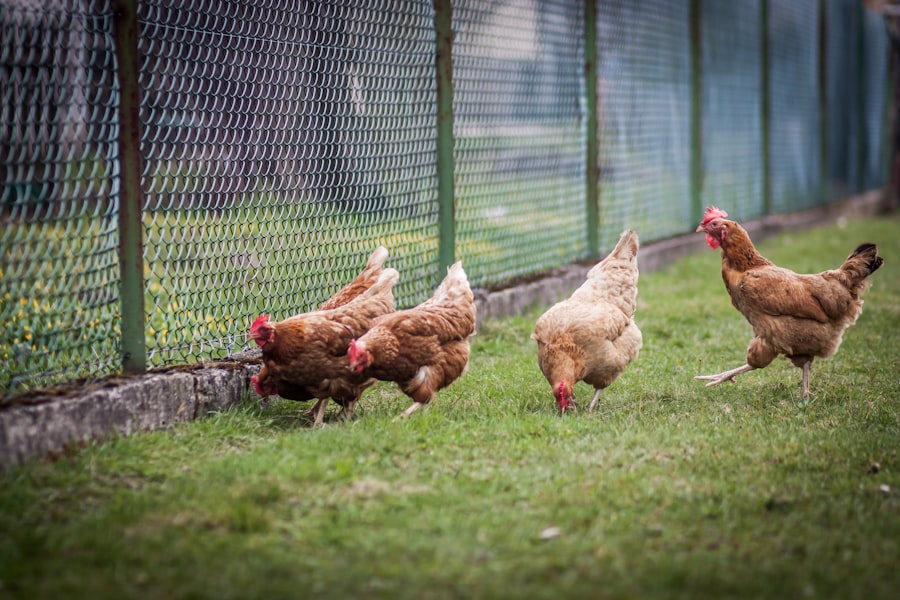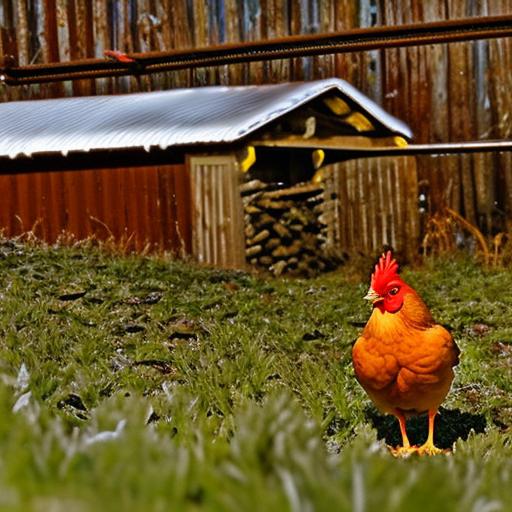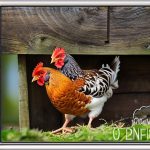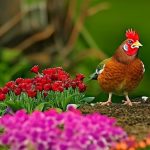Winter care for chickens is an important aspect of raising backyard poultry. As the temperature drops and the days become shorter, it is crucial to provide proper care to keep chickens healthy and comfortable during the colder months. This article will discuss the various aspects of winter care for chickens, including preparing the coop, providing adequate ventilation and insulation, choosing the right bedding material, providing sufficient lighting, adjusting feeding and watering routines, protecting chickens from predators, and monitoring their health.
Key Takeaways
- Chickens have specific needs during winter that must be met to ensure their health and well-being.
- Preparing the chicken coop for winter involves providing adequate ventilation, insulation, and the right bedding material.
- Sufficient lighting is important for chickens during winter to maintain their egg production.
- Feeding and watering chickens in winter requires special attention to ensure they are getting enough nutrients and hydration.
- Protecting chickens from predators and monitoring their health are crucial during winter to prevent illness and injury.
Understanding the Winter Needs of Chickens
Chickens are affected by cold weather in several ways. Firstly, they are more susceptible to frostbite, especially on their combs and wattles. Frostbite occurs when the tissues freeze due to prolonged exposure to cold temperatures. Secondly, chickens may experience a decrease in egg production during the winter months. This is because they require more energy to keep warm and therefore have less energy available for egg production. Lastly, chickens may be more prone to respiratory issues in the winter due to poor ventilation and damp conditions in the coop.
Providing proper care during winter is essential to ensure the well-being of chickens. By taking the necessary steps to keep them warm, dry, and well-fed, you can help prevent frostbite, maintain egg production, and reduce the risk of respiratory illnesses. It is important to remember that chickens are hardy animals and can tolerate cold temperatures to some extent. However, providing them with the right care will help them thrive even in harsh winter conditions.
Preparing the Chicken Coop for Winter
Preparing the chicken coop for winter is crucial to provide a comfortable environment for your flock. The coop should be clean and free from any drafts or leaks that could let in cold air or moisture. Start by thoroughly cleaning the coop and removing any debris or droppings. Inspect the walls, roof, and floor for any cracks or holes that need to be sealed.
Next, ensure that the coop is well-insulated to retain heat. Insulation helps to keep the coop warm by preventing heat loss and reducing drafts. This can be done by adding insulation material to the walls, roof, and floor of the coop. Common insulation materials include straw, hay, wood shavings, or even recycled denim insulation. Make sure to choose a material that is safe for chickens and easy to clean.
Providing Adequate Ventilation
While it is important to keep the coop warm, it is equally important to provide proper ventilation. Ventilation helps to remove moisture and ammonia from the coop, which can lead to respiratory issues if not properly managed. It also helps to regulate the temperature and prevent the buildup of harmful gases.
To provide adequate ventilation without causing drafts, it is recommended to install vents near the roofline of the coop. These vents should be covered with wire mesh to prevent predators from entering. Additionally, make sure that the vents are not blocked by bedding or other materials. Regularly check the vents to ensure they are clean and free from obstructions.
Insulating the Chicken Coop
Insulating the chicken coop is an effective way to keep it warm during winter. Insulation helps to retain heat and prevent drafts, creating a more comfortable environment for your flock. There are several materials that can be used for insulation, including straw, hay, wood shavings, or even recycled denim insulation.
Straw and hay are commonly used as bedding material for chickens and can also serve as insulation when packed tightly in the walls and roof of the coop. Wood shavings are another option that provides good insulation properties. Recycled denim insulation is a more expensive option but offers excellent thermal properties and is easy to install.
When insulating the coop, make sure to cover all walls, including the ceiling and floor if possible. Pay special attention to areas where drafts may occur, such as windows or doors. Insulation should be replaced or refreshed regularly to maintain its effectiveness.
Choosing the Right Bedding Material

Choosing the right bedding material for winter is important to provide comfort and warmth to your chickens. The bedding material should be absorbent, easy to clean, and provide insulation. Common bedding materials include straw, hay, wood shavings, and shredded paper.
Straw and hay are popular choices as they are readily available and provide good insulation properties. They also absorb moisture well and can help keep the coop dry. However, they can be messy and may need to be replaced more frequently.
Wood shavings are another option that provides good insulation and absorbency. They are easy to clean and can help control odors in the coop. However, avoid using cedar shavings as they can be toxic to chickens.
Shredded paper is a cost-effective option that provides good insulation and absorbency. It is easy to clean and can be composted after use. However, it may not provide as much warmth as other bedding materials.
Providing Sufficient Lighting
Lighting is important in the winter as it helps to maintain egg production in chickens. As the days become shorter, chickens receive less natural light, which can disrupt their egg-laying cycle. By providing artificial lighting in the coop, you can help stimulate egg production and maintain a consistent laying schedule.
To provide sufficient lighting, install a light source in the coop that mimics natural daylight. Use a timer to ensure that the lights turn on and off at the appropriate times. The recommended lighting duration is 14-16 hours per day. Make sure to position the lights at a height that is safe for chickens and does not cause any fire hazards.
Feeding and Watering Chickens in Winter
Feeding and watering routines need to be adjusted for winter to ensure that chickens receive adequate nutrition and hydration. During cold weather, chickens require more energy to keep warm, so it is important to provide them with a balanced diet that is high in protein and fat.
Consider adding supplemental feed such as cracked corn or black oil sunflower seeds to their diet. These foods are high in fat and can help provide extra energy during the winter months. However, be cautious not to overfeed, as this can lead to obesity and other health issues.
Water is also crucial for chickens during winter. However, it can freeze quickly in cold temperatures. To prevent this, provide warm water to your flock at least twice a day. You can use heated waterers or place a heated base under the water container to keep it from freezing. Make sure to check the water regularly and replace it if it becomes dirty or frozen.
Protecting Chickens from Predators in Winter
Predators can be more of a threat to chickens in the winter as they may be more desperate for food due to limited resources. It is important to take steps to protect your flock from predators during this time.
Start by securing the coop with sturdy fencing that is buried at least 12 inches deep to prevent predators from digging under. Install hardware cloth or wire mesh around the coop and run to prevent predators from squeezing through or reaching in. Make sure that all doors and windows are securely closed and locked at night.
Consider using motion-activated lights or alarms to deter predators. These can startle them and discourage them from approaching the coop. Additionally, remove any potential food sources such as fallen fruit or garbage that may attract predators.
Monitoring the Health of Chickens in Winter
Monitoring the health of chickens during winter is crucial to catch any signs of illness early and prevent the spread of disease. Cold weather can weaken their immune system, making them more susceptible to illnesses.
Regularly check your flock for any signs of illness, such as lethargy, loss of appetite, coughing, sneezing, or abnormal droppings. If you notice any of these symptoms, isolate the affected chicken and consult a veterinarian for proper diagnosis and treatment.
To prevent illness, make sure that the coop is clean and dry at all times. Remove any wet bedding or droppings promptly to prevent the buildup of harmful bacteria. Provide a clean and dust-free environment for your flock to reduce the risk of respiratory issues.
Winter care for chickens is essential to keep them healthy and comfortable during the colder months. By understanding their winter needs and taking the necessary steps to provide proper care, you can ensure that your flock thrives even in harsh winter conditions. From preparing the coop and providing adequate ventilation and insulation to adjusting feeding and watering routines, protecting from predators, and monitoring their health, every aspect of winter care is important. Take the time to implement these measures and keep your chickens happy and healthy throughout the winter season.
If you’re looking for the best way to keep chickens in the winter, you might also be interested in learning about the importance of a well-designed chicken coop and nest box. A properly constructed coop can provide your chickens with the necessary warmth and protection during the colder months. To find out more about creating a comfortable living space for your feathered friends, check out this informative article on poultrywizard.com.
FAQs
What is the best way to keep chickens warm in the winter?
The best way to keep chickens warm in the winter is to insulate their coop, provide them with a heat source, and ensure they have access to fresh water and food.
What type of bedding should be used in the coop during the winter?
During the winter, it is best to use a deep layer of dry bedding such as straw, hay, or wood shavings to keep the chickens warm and dry.
How often should the water be changed in the winter?
Water should be changed at least twice a day in the winter to prevent it from freezing and to ensure the chickens have access to fresh water.
What type of food should be given to chickens in the winter?
Chickens should be given a balanced diet that includes grains, protein, and vitamins. It is also important to provide them with fresh fruits and vegetables to ensure they are getting all the necessary nutrients.
How can I prevent frostbite in my chickens during the winter?
To prevent frostbite, it is important to keep the coop dry and well-ventilated, provide the chickens with a heat source, and ensure they have access to fresh water and food. It is also important to check their feet and combs regularly for signs of frostbite.
Meet Walter, the feathered-friend fanatic of Florida! Nestled in the sunshine state, Walter struts through life with his feathered companions, clucking his way to happiness. With a coop that’s fancier than a five-star hotel, he’s the Don Juan of the chicken world. When he’s not teaching his hens to do the cha-cha, you’ll find him in a heated debate with his prized rooster, Sir Clucks-a-Lot. Walter’s poultry passion is no yolk; he’s the sunny-side-up guy you never knew you needed in your flock of friends!







